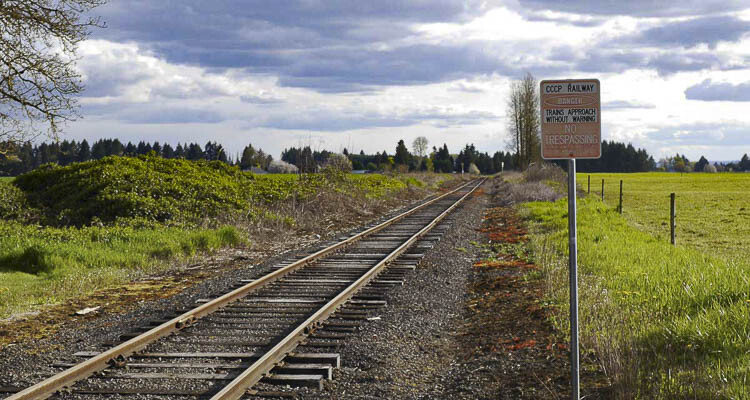Freight Rail Dependent Uses (FRDU) Update – February 2024
Quite a bit has happened regarding the railroad since our last newsletter that included a background on the Chelatchie Prairie Railroad, Portland Vancouver Junction Railroad (PVJR), and the Freight Rail Dependent Uses (FRDU) controversy, as well as FOCC’s position on the matter. You can read up on those here before reading on for the latest updates below.

Image of rail line in Clark County from Clark County Today
Multiple Ongoing Investigations Into Portland Vancouver Junction Railroad (PVJR) with the Environmental Protection Agency (EPA) Taking Lead
Notification from residents of violations in both the Barberton and Chelatchie areas by the PVJR led to site visits from both state and federal agencies. These agencies initiated investigations into PVJR’s unpermitted activity and issued orders for PVJR, including:
- The Army Corp of Engineers (USACE) sent a Notice of Violation – Cease and Desist order to PVJR on December 18, citing potential violation of the Clean Water Act (CWA);
WA Department of Ecology (DOE) reiterated to PVJR that they must apply for a permit (as they had already notified Eric Temple, owner of PVJR, of the need to apply for a permit prior to the action), directing that PVJR perform no further work, including moving dirt, until a permit with DOE was in place. Furthermore, DOE advised PVJR to fill out a SEPA application in order for DOE to evaluate and determine any other potential permits or regulations that may be needed; - Because PVJR failed to meet the deadline for submitting a wetland and stream assessment to DOE, the EPA is now leading the investigation while continuing to coordinate with DOE and state and federal agencies;
The WA Department of Natural Resources (DNR) issued a Notice to Comply to the landowner in Chelatchie, who gave PVJR an easement on his property, for the construction of a road and installing water crossing features without an approved Forest Practices Application (FPA); - The National Oceanic and Atmospheric Administration (NOAA) is also involved. It is important to note that David Price, Branch Chief of the Lower Columbia/Washington Coast Branch of the West Coast Region of NOAA, has directly contradicted Temple’s claims that PVJR has federal pre-emption authority making state and local laws non-applicable to PVJR’s activity, stating that, “Our General Counsel office has reviewed the claims that a pre-emption authority exists for the railroad, and we have determined that they have no such authority.”
As of this newsletter, all investigations are still ongoing. Clark County has initiated a Notice of Breach to PVJR related to actions on Clark County property affecting Curtin Creek. The county has stated repeatedly that they must await conclusions of the investigations before proceeding any further.
FOCC and Allies Request to Repeal SB 5517, enacted in 2017, in the Washington State Legislature this session
FOCC, along with our allies on this issue, sent joint letters along with supporting documents to all representatives and senators in the Washington State Legislature, imploring them to repeal this law. This legislation enabled economic development along publicly owned railroads, including the extension of urban services and implementing infrastructure for freight rail dependent uses adjacent to railroad lines. This created the ongoing threat of heavy industrial railroad activity that would devastate our homes, critical habitat areas, water, forest, and farmland included in the 33 miles of short line rail running through the heart of Clark County.
Friends of Clark County also opposed HB 1371 and SB 5494, which further incentivizes rail operators by providing significant tax breaks for those infrastructure expenses. This legislation clearly favors the PVJR operator and places those railroad infrastructure costs in the laps of Washington State taxpayers. HB 1371 passed the House and SB 5494 is in the Senate Ways and Means Committee as of 2/26/2024.
County Spends $100,000 of Taxpayer Money on FRDU Consultant, FOCC opposed
We opposed Clark County’s recent decision to spend $100,000 of taxpayer funds on a consultant to assist in implementing the FRDU allowing for heavy industrial uses of our publicly owned short line railroad despite the allegations, ongoing investigations by federal and state agencies, breach of lease process, and public outcry associated with actions of the rail operator, PVJR. We generated many letters to the council from our friends prior to the vote. Friends of Clark County believes that spending money now before knowing what will happen with the rail operator, rather than postponing, was an irresponsible use of funds paid for by the hardworking people of Clark County, many of whom are not supportive of the FRDU.
Although we did not get the outcome we had hoped for, the fact that many spoke out on short notice of this vote is a testament to the strength of our movement, sending a message to county government that the community is not going to back down on this and will see this through to a just conclusion.
In addition, we voiced concerns about transparency to Clark County regarding this meeting and vote. There was no written description within the Request for Proposal (RFP) for the FRDU consultant, which was also not linked on the meeting agenda for the public, and when asked by Councilor Marshall, Oliver Orjiako said it was to consult on just 400 acres, which was not mentioned in the RFP. Councilors and the public were caught by surprise, and it appeared that some councilors were not clear on whether this consultant work was contractually obligated by the lease with PVJR or not as they were taking their votes. As of this date, we still do not know if this FRDU consultant was contractually obligated and if the councilors did or did not know the correct answer to that question when 4 of them voted to spend $100,000 in taxpayer funds on the FRDU instead of putting it on hold.
Friends of Clark County’s Position on the Railroad
Friends of Clark County holds that Clark County should terminate the contractual relationship between Clark County and the PVJR and encourages a search for a rail operator who supports the best interests of Clark County communities with integrity and transparency. We will continue to make it clear to county decision makers that the existing contract is significantly damaging – as evidenced by 4 years of history – to Clark County’s environment without hesitation.
Taking this action is critical in order to hold PVJR accountable and needs to be immediate to ensure that the County avert any further damage to our forested wetlands, critical habitat, clean water, and established neighborhoods and communities.
Furthermore, members of the County Council voted to include consideration of Heavy Industrial (IH) uses in the FRDU as part of the FRDU process. FOCC supports responsible uses of this existing railroad as long as those uses minimize the impacts on our environment and communities.
As a community, we must stand strong in ensuring the County fulfills its obligation to protect our water, air, and the livability of Clark County for all of our citizens, all of us whom will be impacted by this plan for an industrial wasteland in one way or another, and especially those who reside next to the existing railroad track and/or the potential future overlays related to the FRDU.
Read our full position statement here.
YOU CAN HELP! TAKE ACTION – HERE’S WHAT YOU CAN DO:
- Get involved, especially if you are near the railroad. Write to all of the councilors. Contact info here: www.clark.wa.gov/councilors
- Go to Clark County Council meetings and give up to 3-minutes of testimony during OPEN PUBLIC COMMENT. County meeting information can be found at www.clark.wa.gov/councilors/clark-county-council-meetings Stay up to date—a lot about the Chelatchie Prairie Railroad and its projected activities can be found on the County websites.
- We also provide updates and information on our social media accounts (Facebook and Instagram).
Donate to Friends of Clark County. Donations help us be a watchdog in our community, fund litigation that protects residents and the environment, and helps ensure that we have resources for community engagement and advocacy.
